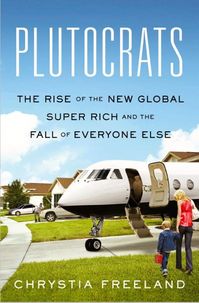Plutocrats: Can you guess how the top 0.1 percent live?

President Obama’s insistence on new taxes for wealthy Americans puts a spotlight on the underlying issue of record levels of economic inequality. By now, we all know there is a huge gap; we’ve discussed it at OurValues.org this autumn. And, we are familiar with the terms “1 percent” and “99 percent,” made popular by the Occupy Wall Street movement.
But are you also familiar with the “0.1 percent”?
Members of the 0.1 percent are the ultra rich among the 1 percent, the tip of the top of the income and wealth pyramid. The gap between the 1 percent and the 99 percent has widened considerably over the years, as we’ve discussed before. But the widest chasm has occurred within the 1 percent.
“The social gap isn’t just between the rich and the poor,” writes journalist Chrystia Freeland in her new book, Plutocrats: The Rise of the New Global Super-Rich and the Fall of Everyone Else. “It is between the super-rich and the merely wealthy (who might not feel quite so wealthy when they compare themselves with their super-successful peers).”
Some comparisons put this into perspective. Freeland cites statistics to show what inequality looks like when it’s translated into average U.S. family income:
Top 0.01 percent: A family is this category has an annual income of $23,849,950.
Top 0.1 to 0.01 percent: Annual family income of $2,802,020.
Top 1 percent: Annual family income of $1,019,089.
Top 10 percent: Annual family income of $246,934.
Bottom 90 percent: Annual family income of $29,840.
This means, for example, that a family in the top 0.01 percent has an annual income 800 times greater than a family in the bottom 90 percent.
Freeland calls the super-rich “plutocrats,” and she had access into the inner sanctum of this rarified world. Her book reports who they are, how they got so rich, what they think of themselves and the rest of us and what this means for our society.
Plutocrat is an interesting choice of label. A plutocracy means government by the rich. While the super-rich certainly have disproportionate influence on government, her idea is closer to the meaning of plutonomy, a term coin in a now-famous memo by Citigroup investment strategists. According to Investopedia, this refers to “economic growth that is powered and consumed by the wealthiest upper class of society. [It] refers to a society where the majority of the wealth is controlled by an ever-shrinking minority; as such, the economic growth of that society becomes dependent on the fortunes of that same wealthy minority.”
Are you concerned by the rise of the ultra rich?
Is the economy essentially run by and for the plutocrats?
Wayne Baker is a sociologist on the faculty of the University of Michigan Ross School of Business. Baker blogs daily at Our Values and can be reached at ourvaluesproject@gmail.com or on Facebook.


Comments
vivian
Wed, Dec 12, 2012 : 4:25 p.m.
Bought by the super rich, yes, dsponini--but far worse, run by it for the benefit of themselves and their friends. Have you seen the recently-published list of the wealthiest members of Congress?
dsponini
Mon, Dec 10, 2012 : 5:44 p.m.
More and more our government is being bought by Plutocrats...to hell with the regular people!